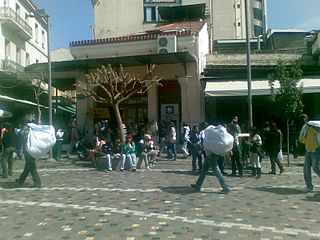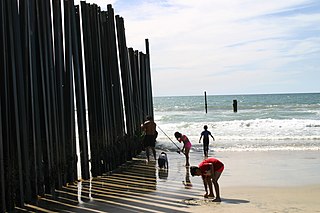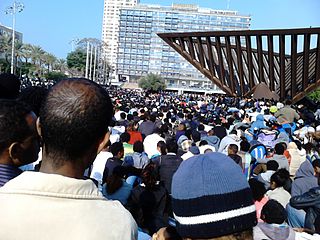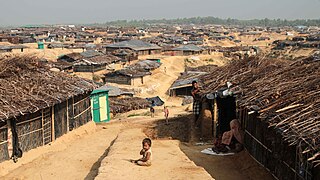Related Research Articles
Immigration detention is the policy of holding individuals suspected of visa violations, illegal entry or unauthorized arrival, as well as those subject to deportation and removal until a decision is made by immigration authorities to grant a visa and release them into the community, or to repatriate them to their country of departure. Mandatory detention refers to the practice of compulsorily detaining or imprisoning people who are considered to be illegal immigrants or unauthorized arrivals into a country. Some countries have set a maximum period of detention, while others permit indefinite detention.

The Rohingya people are a stateless ethnic group who predominantly follow Islam and reside in Rakhine State, Myanmar. Before the Rohingya genocide in 2017, when over 740,000 fled to Bangladesh, an estimated 1.4 million Rohingya lived in Myanmar. Described by journalists and news outlets as one of the most persecuted minorities in the world, the Rohingya are denied citizenship under the 1982 Myanmar nationality law. There are also restrictions on their freedom of movement, access to state education and civil service jobs. The legal conditions faced by the Rohingya in Myanmar have been compared to apartheid by some academics, analysts and political figures, including Nobel laureate Bishop Desmond Tutu, a South African anti-apartheid activist. The most recent mass displacement of Rohingya in 2017 led the International Criminal Court to investigate crimes against humanity, and the International Court of Justice to investigate genocide.
Immigration law includes the national statutes, regulations, and legal precedents governing immigration into and deportation from a country. Strictly speaking, it is distinct from other matters such as naturalization and citizenship, although they are sometimes conflated. Countries frequently maintain laws that regulate both the rights of entry and exit as well as internal rights, such as the duration of stay, freedom of movement, and the right to participate in commerce or government.
Illegal immigration to Malaysia is the cross-border movement of people to Malaysia under conditions where official authorisation is lacking, breached, expired, fraudulent, or irregular. The cross-border movement of workers has become well-established in Southeast Asia, with Malaysia a major labour-receiving country and Indonesia and the Philippines the region's main labour-sending states. Managing cross-border migration has become an issue of increasing concern in Malaysia and its international relations.

Since its independence in 1947, India has accepted various groups of refugees from neighbouring countries, including partition refugees from former British Indian territories that now constitute Pakistan and Bangladesh, Tibetan refugees that arrived in 1959, Chakma refugees from present day Bangladesh in early 1960s, other Bangladeshi refugees in 1965 and 1971, Sri Lankan Tamil refugees from the 1980s and most recently Rohingya refugees from Myanmar. In 1992, India was seen to be hosting 400,000 refugees from eight countries. According to records with the Union Ministry of Home Affairs, as on January 1,2021, there were 58,843 Sri Lankan refugees staying in 108 refugee camps in Tamil Nadu and 54 in Odisha and 72,312 Tibetan refugees have been living in India.
Illegal immigration is the migration of people into a country in violation of that country's immigration laws, or the continuous residence in a country without the legal right to do so. Illegal immigration tends to be financially upward, from poorer to richer countries. Illegal residence in another country creates the risk of detention, deportation, and other imposed sanctions.
Immigration to South Korea is low due to restrictive immigration policies resulting from strong opposition to immigrants from the general Korean public. However, in recent years with the loosening of the law, influx of immigrants into South Korea has been on the rise, with foreign residents accounting for 4.9% of the total population in 2019. Between 1990 and 2020, South Korea's migrant population has grown 3.896%, second highest level of growth in the world.

Immigration to Greece percentage of foreign populations in Greece is 7.1% in proportion to the total population of the country. Moreover, between 9 and 11% of the registered Greek labor force of 4.4 million are foreigners. Migrants additionally make up 25% of wage and salary earners.
According to the United States Department of State, "Thailand is a source, destination, and transit country for men, women, and children subjected to forced labour and sex trafficking." Thailand's relative prosperity attracts migrants from neighboring countries who flee conditions of poverty and, in the case of Burma, military repression. Significant illegal migration to Thailand presents traffickers with opportunities to coerce or defraud undocumented migrants into involuntary servitude or sexual exploitation. Police who investigated reaching high-profile authorities also received death threats in 2015.

Illegal entry is the act of foreign nationals arriving in or crossing the borders into a country in violation of its immigration law. Human smuggling is the practice of aiding people in crossing international borders for financial gain, often in large groups. Human smuggling is associated with human trafficking. A human smuggler will facilitate illegal entry into a country for a fee, but on arrival at their destination, the smuggled person is usually free. Trafficking involves physical force, fraud, or deception to obtain and transport people, usually for enslavement or forced prostitution.

Immigration to Pakistan is the legal entry and settlement of foreign nationals in Pakistan. Immigration policy is overseen by the Interior Minister of Pakistan through the Directorate General Passports. Most immigrants are not eligible for citizenship or permanent residency, unless they are married to a Pakistani citizen or a Commonwealth citizen who has invested a minimum of PKR 5 million in the local economy.

In South Korea, immigration policy is handled by the immigration services of the Ministry of Justice, Ministry of Labor, Ministry of Health and Welfare and the Ministry of Foreign Affairs and Trade. The Nationality Act, Immigration Control Act, Multicultural Families Support Act, and the Framework Act on Treatment of Foreigners are the foundations of immigration policy in Korea. The Korean government initiated a discussion in 2003 on establishing an independent immigration office to accommodate fast-growing immigrant and to prepare inclusive and rational immigration policies; however, there has been little progress. The Foreigner Policy Committee, headed by the Prime Minister, coordinates foreigner-related policies which were handled by many ministries. However, its role is limited because of a shortage of resources and manpower. The establishment of an Immigration Office is expected to solve these problems by concentrating all related resources and manpower under one umbrella.
Malaysia ratified the 2000 UN TIP Protocol in February 2009.

African immigration to Israel is the international movement to Israel from Africa of people that are not natives or do not possess Israeli citizenship in order to settle or reside there. This phenomenon began in the second half of the 2000s, when a large number of people from Africa entered Israel, mainly through the then-lightly fenced border between Israel and Egypt in the Sinai Peninsula. According to the data of the Israeli Interior Ministry, 26,635 people arrived illegally in this way by July 2010, and over 55,000 by January 2012. In an attempt to curb the influx, Israel constructed the Egypt–Israel barrier. Since its completion in December 2013, the barrier has almost completely stopped the immigration of Africans into Israel across the Sinai border.
Illegal immigration to China is the process of migrating into China in violation of Chinese immigration laws. The Chinese government has instituted policies against illegal immigration, particularly from North Korean refugees and defectors, workers and refugees from Vietnam, the Philippines, Myanmar, Laos and Africans in Guangzhou.

According to the Japanese Ministry of Justice, the number of foreign residents in Japan has steadily increased in the post Second World War period, and the number of foreign residents was more than 2.76 million at the end of 2022. Being a country with a total estimated population of 125.57 million in 2020, the resident foreign population in Japan amounts to approximately 2.29% of the total population.

In 2015, hundreds of thousands of Rohingya people were forcibly displaced from their villages and IDP camps in Rakhine State, Myanmar, due to sectarian violence. Nearly one million fled to neighbouring Bangladesh and some travelled to Southeast Asian countries including Malaysia, Indonesia, Cambodia, Laos and Thailand by rickety boats via the waters of the Strait of Malacca, Bay of Bengal and the Andaman Sea.
An illegal immigrant in India is a foreigner who has entered India either without valid documents or who initially had a valid document, but has overstayed beyond the permitted time, as per the general provisions of the Citizenship Act as amended in 2003. Such persons are not eligible for citizenship by registration or naturalisation. They are also liable to be imprisoned for 2–8 years and fined.
Immigration detention of refugee and asylum seeking children in Thailand violates the rights of children under international law. The undocumented migrant children are detained for indefinite and prolonged periods without proper access to legal support. Thailand is key transit route, host and final destination for refugees seeking asylum in southeast Asia and Australia. During the Universal Periodic Review (UPR) session in May 2016, various human rights issues including detention of refugee and asylum seeking children were reported. Currently, there are no effective alternatives to immigration detention and all sectors of population including children are subject to detention.
Federal policy oversees and regulates immigration to the United States and citizenship of the United States. The United States Congress has authority over immigration policy in the United States, and it delegates enforcement to the Department of Homeland Security. Historically, the United States went through a period of loose immigration policy in the early-19th century followed by a period of strict immigration policy in the late-19th and early-20th centuries. Policy areas related to the immigration process include visa policy, asylum policy, and naturalization policy. Policy areas related to illegal immigration include deferral policy and removal policy.
References
- ↑ "Illegal Immigrants Take Refuge In Pattaya As Beggars". Pattaya Daily News. Archived from the original on 2012-02-10. Retrieved 2012-04-07.
- ↑ "Pattaya City-Thailand Focus on Illegal Immigrant Crackdown". Pattaya Daily News. Archived from the original on 2012-02-10. Retrieved 2012-04-07.
- ↑ "Illegal North Korean migrants on rise". Bangkok Post . Retrieved 2012-04-07.
- ↑ "Thailand's deadly treatment of migrants". BBC . Retrieved 2012-04-07.
- ↑ Elimä, Nyrola; Mauk, Ben (November 10, 2024). "He Made a Daring Escape From China. Then His Real Troubles Began". The New York Times . Retrieved November 19, 2024.
- ↑ "Expats in Thailand caught in bureaucratic tangle". Bbc.co.uk. August 29, 2019. Retrieved 29 August 2019.